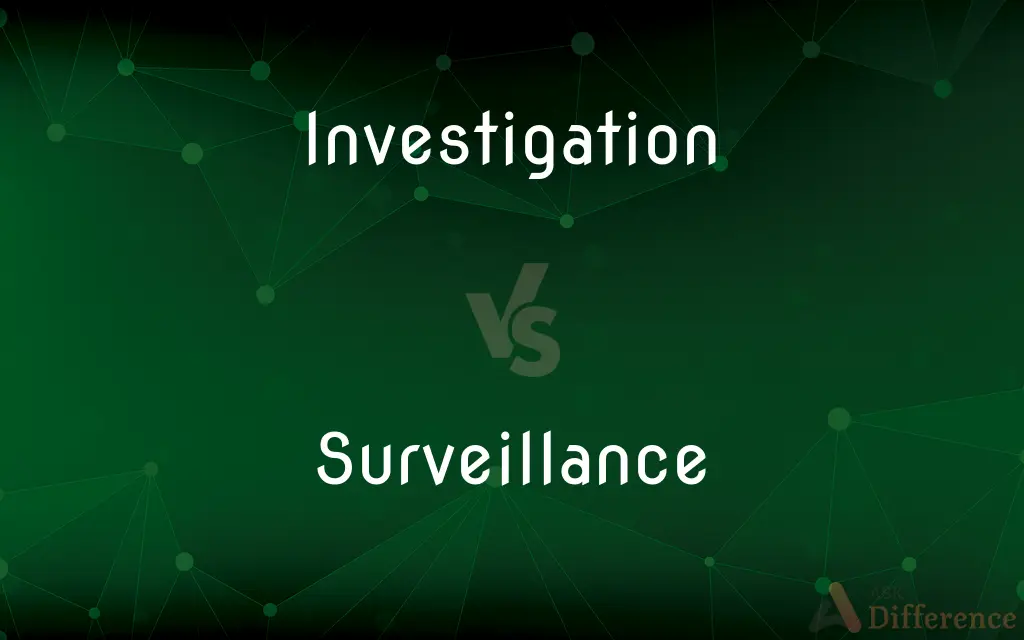Investigation vs. Surveillance — What's the Difference?
By Fiza Rafique & Maham Liaqat — Updated on April 16, 2024
Investigation involves systematically examining a situation to uncover facts or gather evidence, often after an incident, while surveillance is the continuous monitoring of activities, often to prevent incidents or gather intelligence.

Difference Between Investigation and Surveillance
Table of Contents
ADVERTISEMENT
Key Differences
Investigation is a process used primarily to uncover details and gather evidence about specific events, incidents, or allegations. On the other hand, surveillance refers to the ongoing observation or monitoring of individuals, places, or activities, typically to detect or prevent illicit activities.
Investigations are typically reactive, initiated after an event has occurred or when there is suspicion of wrongdoing. Whereas surveillance is often proactive, set up to continuously gather information or data to prevent potential issues or to maintain security.
An investigation usually involves a detailed and often finite process, aiming to resolve a specific question or legal issue. In contrast, surveillance can be indefinite, ongoing without a predetermined end date unless the objective changes.
Investigative methods might include interviewing witnesses, analyzing documents, or forensic analysis. Conversely, surveillance techniques often involve the use of cameras, wiretaps, or tracking devices to monitor behavior over time.
While investigations can lead to legal proceedings or formal outcomes based on the findings, surveillance may not necessarily result in immediate action but is used to inform potential future investigations or interventions.
ADVERTISEMENT
Comparison Chart
Definition
Systematic examination to uncover facts
Continuous monitoring to gather intelligence
Purpose
To resolve specific questions after incidents
To prevent incidents or monitor continuously
Reactivity
Reactive to specific incidents
Proactive, often as a preventive measure
Duration
Typically finite, concludes with a report
Can be ongoing, indefinite
Methods
Interviews, document analysis, forensics
Cameras, wiretaps, tracking devices
Compare with Definitions
Investigation
Process of gathering evidence for clarity on an issue.
The company conducted an internal investigation to find the source of the leak.
Surveillance
Gathering intelligence through observation.
The agency's surveillance revealed the suspect's movements.
Investigation
Detailed analysis to resolve questions.
The scientific investigation helped solve the environmental issue.
Surveillance
Monitoring activities to detect changes.
Surveillance cameras were installed at all major intersections.
Investigation
Forensic analysis to uncover facts.
Forensic investigation was crucial in solving the case.
Surveillance
Use of technology to track individuals.
GPS surveillance helped recover the stolen vehicle.
Investigation
A systematic examination of a crime.
The police launched an investigation into the burglary.
Surveillance
Preventive monitoring to avoid incidents.
Online surveillance is used to prevent cyber threats.
Investigation
Inquiry into specific allegations.
The investigation confirmed the accusations were unfounded.
Surveillance
Continuous observation for security.
The security team kept the building under surveillance 24/7.
Investigation
The action of investigating something or someone; formal or systematic examination or research
He is under investigation for receiving illicit funds
Surveillance
Surveillance is the monitoring of behavior, many activities, or information for the purpose of information gathering, influencing, managing or directing. This can include observation from a distance by means of electronic equipment, such as closed-circuit television (CCTV), or interception of electronically transmitted information like Internet traffic.
Investigation
The act or process of investigating
A politician under investigation.
Surveillance
Close observation of a person or group, especially one under suspicion.
Investigation
A careful examination or search in order to discover facts or gain information.
Surveillance
The act of observing or the condition of being observed.
Investigation
The act of investigating; the process of inquiring into or following up; research, especially patient or thorough inquiry or examination
The investigation into the crime has led to various leads as well as plenty of dead ends.
Despite thorough investigation, the perpetrator of the attacks remains unknown.
Carry out an investigation
The matter is awaiting investigation
The case is still under investigation.
Surveillance
Close observation of an individual or group; person or persons under suspicion.
Investigation
The act of investigating; the process of inquiring into or following up; research; study; inquiry, esp. patient or thorough inquiry or examination; as, the investigations of the philosopher and the mathematician; the investigations of the judge, the moralist.
Surveillance
Continuous monitoring of disease occurrence for example.
Investigation
An inquiry into unfamiliar or questionable activities;
There was a congressional probe into the scandal
Surveillance
Systematic observation of places and people by visual, aural, electronic, photographic or other means.
Investigation
The work of inquiring into something thoroughly and systematically
Surveillance
(legal) In criminal law, an investigation process by which police gather evidence about crimes, or suspected crime, through continued observation of persons or places.
Surveillance
Oversight; watch; inspection; supervision.
That sort of surveillance of which . . . the young have accused the old.
Surveillance
Close observation of a person or group (usually by the police)
Common Curiosities
Can surveillance lead to an investigation?
Yes, surveillance can reveal information that necessitates a formal investigation.
Is surveillance always legal?
Surveillance legality depends on jurisdiction and context; it must usually comply with privacy laws and regulations.
What is the main difference between investigation and surveillance?
Investigation is a systematic process to uncover specific facts post-incident, while surveillance is ongoing monitoring to gather intelligence or prevent issues.
How do businesses use surveillance?
Businesses use surveillance for security, to monitor operations, and prevent theft.
What impact does surveillance have on privacy?
Surveillance can significantly impact privacy, raising concerns about data protection and personal freedoms.
What tools are commonly used in investigations?
Common tools include interviews, forensics, and document analysis.
How do investigators use surveillance data?
Investigators use surveillance data to track suspects, confirm or dispel alibis, and gather evidence.
What ethical considerations apply to surveillance?
Surveillance must balance security needs against individuals' right to privacy.
Can an investigation occur without surveillance?
Yes, investigations can rely on various methods that do not include surveillance.
What are the challenges in conducting surveillance?
Challenges include maintaining privacy, managing vast data, and ensuring legal compliance.
Share Your Discovery

Previous Comparison
Glue vs. Clue
Next Comparison
Angler vs. PirateAuthor Spotlight
Written by
Fiza RafiqueFiza Rafique is a skilled content writer at AskDifference.com, where she meticulously refines and enhances written pieces. Drawing from her vast editorial expertise, Fiza ensures clarity, accuracy, and precision in every article. Passionate about language, she continually seeks to elevate the quality of content for readers worldwide.
Co-written by
Maham Liaqat















































